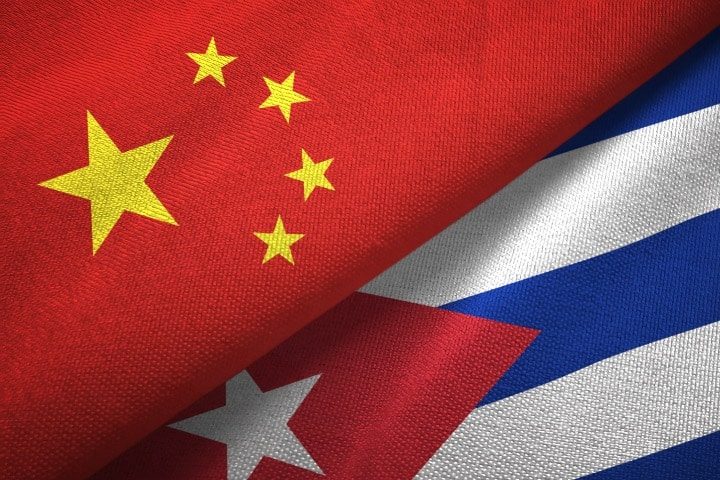
Over the past weekend, in light of Beijing’s attempts to overhaul its intelligence-gathering abilities — including flying a spy balloon over the United States earlier this year — an official in the Biden administration confirmed that China has been running a military base in Cuba since at least 2019.
The unnamed official, who spoke on the condition of anonymity, admitted that U.S. intelligence circles have known for some time about China’s espionage activities from Cuba as part of the country’s worldwide intelligence-gathering projects.
The Wall Street Journal (WSJ) reported that Cuba and China had additionally inked a deal to construct a clandestine electronic eavesdropping station in Cuba itself, with China allegedly hoping to compensate Cuba with billions of dollars as part of the plan. Quoting American officials familiar with classified intelligence, the WSJ said such a spy installation would enable Beijing to tap into electronic communications from the southeastern United States, which is home to many American military bases, as well as observe American ship traffic.
The White House questioned the accuracy of the WSJ report.
“I’ve seen that press report, it’s not accurate,” White House National Security Council spokesman John Kirby declared in an MSNBC interview, without providing too many details as to why the report was supposedly unreliable. “What I can tell you is that we have been concerned since day one of this administration about China’s influence activities around the world; certainly in this hemisphere and in this region, we’re watching this very, very closely.”
The American intelligence community had determined that Chinese spying from Cuba has been an “ongoing” matter and is “not a new development,” the unnamed official stated. The latter, who is well acquainted with U.S. intelligence on this matter, remarked that the Biden administration has increased efforts to impede Chinese espionage attempts and thinks it has made some strides via channels such as diplomacy.
In a Twitter post, Cuban Deputy Foreign Minister Carlos Fernández de Cossío lambasted the WSJ article:
“The slanderous speculation continues, evidently promoted by certain media to cause harm and alarm without observing minimum patterns of communication and without providing data or evidence to support what they disseminate,” he tweeted.
“All are fallacies promoted with the perfidious intention of justifying the unprecedented intensification of the blockade, destabilization and aggression against Cuba and to deceive the public opinion of the United States and the world. The hostility of the United States against Cuba and the extreme and cruel measures that cause humanitarian damage and punish the Cuban people cannot be justified in any way.”
The Cuban minister added: “Regardless of the sovereign rights that Cuba has in defense matters, our country is a signatory to the Declaration of Latin America and the Caribbean as a Zone of Peace, signed in Havana in January 2014. By virtue of it, we reject any foreign military presence in Latin America and the Caribbean, including that of numerous U.S. military bases and personnel, especially in the military base that illegally occupies a portion of the national territory in the province of Guantanamo.”
On June 12, Kirby revealed that America has expressed concerns with Cuba about permitting Chinese spy activities on its territory, adding that while bilateral ties with China were tense at the moment, Washington was bent on maintaining open communication lines.
Soon after Biden assumed office in January 2021, the U.S. intelligence community briefed his national security team regarding Chinese efforts in several places around the globe where Beijing was considering expanding logistics, basing, and collection infrastructure as part of the People’s Liberation Army’s (PLA) efforts to boost its influence globally, the official said, before elaborating that among such efforts was Beijing’s overhaul of its spying operations on Cuba in 2019.
While Biden and his sycophants have been trying to downplay the recent revelations, U.S. Representative Carlos Gimenez (R-Fla.), a Cuban-born U.S. lawmaker who represents the congressional district closest to Cuba, told the White House that recent Chinese actions in Cuba were “an imminent threat” to America and a “direct threat” to his constituents and to regional tourists.
“The Castro regime in Cuba is a listed State Sponsor of Terrorism that actively pursues opportunities to undermine the United States and threaten the safety & wellbeing of our citizens. Allowing Communist China to establish a base in Cuba is only the latest example of the Castro regime’s long history of coercive, anti-American pursuits,” he said.
Gimenez mentioned that “Communist China is proactively undermining the United States across the Western Hemisphere and I urge this Administration to build a robust, comprehensive, and expedient strategy to counter the CCP’s [Chinese Communist Party] malign influence with neighboring states.”
The lawmaker asked Biden to “condemn this blatant threat to our national security interests,” as well as to enforce new sanctions, either on Cuba or China.
In a video message, Gimenez said: “It should give President Biden and [Secretary of State Antony] Blinken you know, maybe a second thought, on whether to reestablish ties with Cuba, open up dialogue with Cuba.”
China has denied the allegations about its spy base in Cuba, instead castigating America for “spreading rumors and slander” about Chinese activities. The Chinese slammed the United States for accusing Beijing of spying on America, calling the U.S. the “most powerful hacker empire” with a long-documented track record of spying on China and other countries.
For example, in February this year, in a boost to its already prevalent worldwide military presence, America obtained access to four additional military bases in the Philippines, providing Washington a premier seat to keep tabs on Chinese activities in the South China Sea and around Taiwan.
At least 20 CIA informants and assets were reported in 2018 to have been arrested and executed by the Chinese government for conducting espionage activities for the United States, with the breach in security supposedly due to Jerry Chun Sing Lee, a former CIA officer suspected of conducting espionage activities for China. The FBI-CIA task force that investigated Chun’s case concluded that the Chinese government managed to tap Chun to decipher the CIA’s method of clandestine communication with its spies. American officials also suspect that China then shared that information with Russia, which employed it to uncover and even possibly execute American spies in that country.



